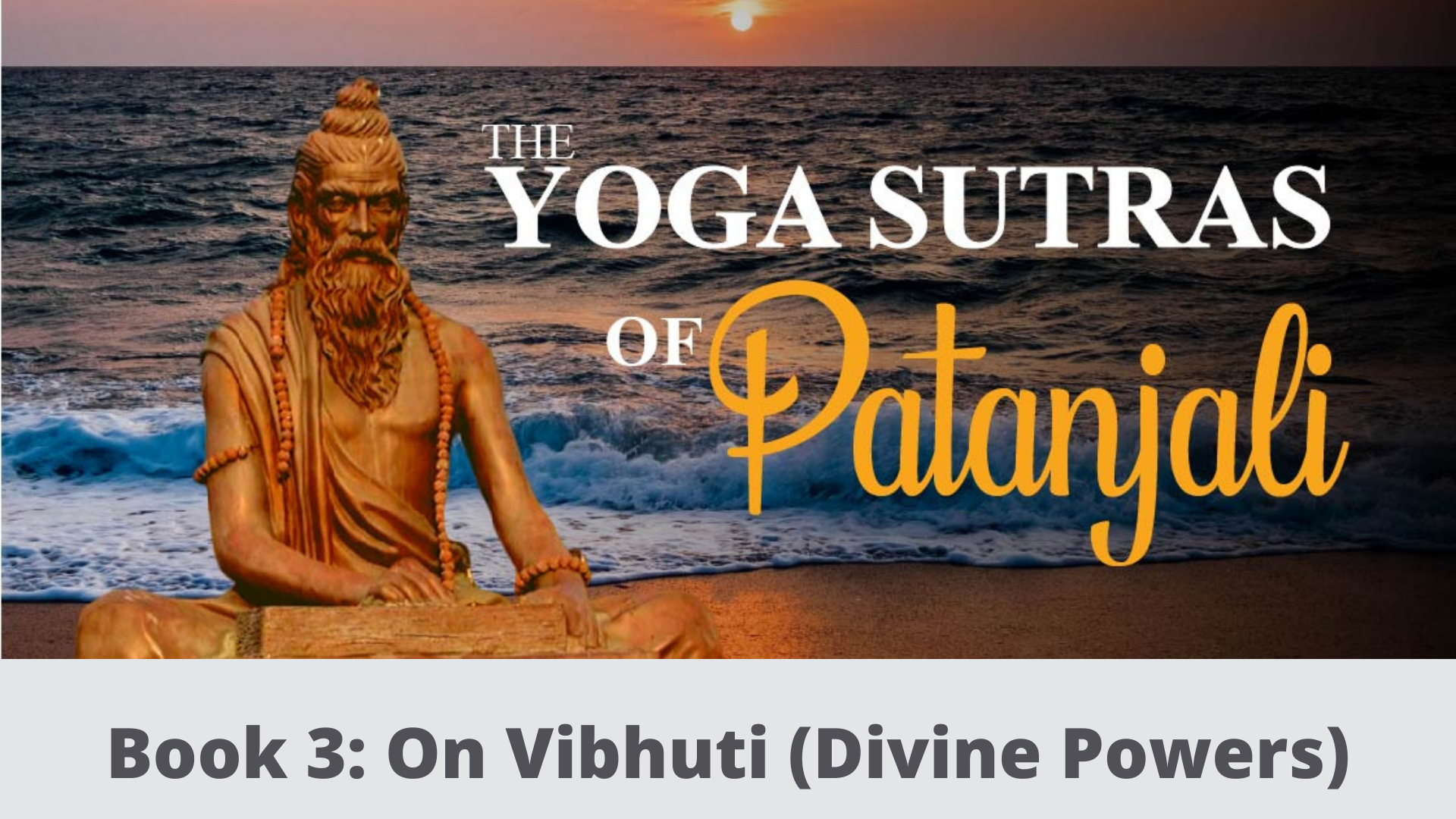Below are the 56 translated verses from the third part of Patanjali’s Yoga Sutra. The third chapter of the Yoga Sutra starting with verse 3.1 deals with the concept of Vibhuti or Divine Powers. In this chapter, Patanjali tells the secret of how vibhuti can be obtained through Yoga. Vibhuti also means glory, prosperity, and siddhi.
So read the whole chapter carefully if you want to learn the path to attain vibhuti.
Chapter 2 of Yoga Sutra is in this article.
| Verse Number | Translation |
| 3.1 | One-pointedness is steadfastness of the mind. |
| 3.2 | Unbroken continuation of that mental ability is meditation. |
| 3.3 | That same meditation when there is only consciousness of the object of meditation and not of the mind is realization. |
| 3.4 | The three appearing together are self-control. |
| 3.5 | By mastery comes wisdom. |
| 3.6 | The application of mastery is by stages. |
| 3.7 | The three are more efficacious than the restraints. |
| 3.8 | Even that is external to the seedless realization. |
| 3.9 | The significant aspect is the union of the mind with the moment of absorption, when the outgoing thought disappears and the absorptive experience appears. |
| 3.10 | From sublimation of this union comes the peaceful flow of unbroken unitive cognition. |
| 3.11 | The contemplative transformation of this is equalmindedness, witnessing the rise and destruction of distraction as well as one-pointedness itself. |
| 3.12 | The mind becomes one-pointed when the subsiding and rising thought-waves are exactly similar. |
| 3.13 | In this state, it passes beyond the changes of inherent characteristics, properties and the conditional modifications of object or sensory recognition. |
| 3.14 | The object is that which preserves the latent characteristic, the rising characteristic or the yet-to-be-named characteristic that establishes one entity as specific. |
| 3.15 | The succession of these changes in that entity is the cause of its modification. |
| 3.16 | By self-control over these three-fold changes (of property, character and condition), knowledge of the past and the future arises. |
| 3.17 | The sound of a word, the idea behind the word, and the object the idea signifies are often taken as being one thing and may be mistaken for one another. By self-control over their distinctions, understanding of all languages of all creatures arises. |
| 3.18 | By self-control on the perception of mental impressions, knowledge of previous lives arises. |
| 3.19 | By self-control one can know the image in the minds of others. |
| 3.20 | The perception achieved through self-control does not lead to know the factors that support the mental image in the mind of others, because that is not the object of self-control. |
| 3.21 | Applying the self-control to the shape of the body so as to interrupt the power of reception, it breaks the contact between the eye of an observer and the light produced by the body, and therefore the body becomes invisible. |
| 3.22 | This principle also explains the disappearance of the sound. |
| 3.23 | Action is of two kinds, dormant and fruitful. By self-control on such action, one portends the time of death. |
| 3.24 | By performing self-control on friendliness, the strength to grant joy arises. |
| 3.25 | By self-control over any kind of strength, such as that of the elephant, that very strength arises. |
| 3.26 | By self-control of what is subtle, hidden or distant the yogi acquires a complete knowledge of that. |
| 3.27 | By self-control on the Sun comes knowledge of spatial specificities. |
| 3.28 | By self-control on the Moon comes knowledge of the heavens. |
| 3.29 | By self-control on the Polestar arises knowledge of orbits. |
| 3.30 | By self-control on the navel arises knowledge of the constitution of the body. |
| 3.31 | By self-control on the pit of the throat one subdues hunger and thirst. |
| 3.32 | By self-control on the tube within the chest one acquires absolute steadiness. |
| 3.33 | By self-control on the light in the head one envisions perfected beings. |
| 3.34 | There is knowledge of everything from intuition. |
| 3.35 | Self-control on the heart brings knowledge of the mental entity. |
| 3.36 | Experience arises due to the inability of discerning the attributes of vitality from the indweller, even though they are indeed distinct from one another. Self-control brings true knowledge of the indweller by itself. |
| 3.37 | This spontaneous enlightenment results in intuitional perception of hearing, touching, seeing and smelling. |
| 3.38 | To the outward turned mind, the sensory organs are perfections, but are obstacles to realization. |
| 3.39 | When the bonds of the mind caused by action have been loosened, one may enter the body of another by knowledge of how the nerve-currents function. |
| 3.40 | By self-control of the nerve-currents utilizing the life breath, one may levitate, walk on water, swamps, thorns, or the like. |
| 3.41 | By self-control over the maintenance of breath, one may radiate light. |
| 3.42 | By self-control on the relation of the ear to the ether one gains distant hearing. |
| 3.43 | By self-control over the relation of the body to the ether, and maintaining at the same time the thought of the lightness of cotton, one is able to pass through space. |
| 3.44 | By self-control on the mind when it is separated from the body- the state known as the Great Transcorporeal- all coverings are removed from the Light. |
| 3.45 | Mastery over the elements arises when their gross and subtle forms,as well as their essential characteristics, and the inherent attributes and experiences they produce, is examined in self-control. |
| 3.46 | Thereby one may become as tiny as an atom as well as having many other abilities, such as perfection of the body, and non-resistance to duty. |
| 3.47 | Perfection of the body consists in beauty, grace, strength and adamantine hardness. |
| 3.48 | By self-control on the changes that the sense-organs endure when contacting objects, and on the power of the sense of identity, and of the influence of the attributes, and the experience all these produce- one masters the senses. |
| 3.49 | From that come swiftness of mind, independence of perception, and mastery over primordial matter. |
| 3.50 | To one who recognizes the distinctive relation between vitality and indweller comes omnipotence and omniscience. |
| 3.51 | Even for the destruction of the seed of bondage by desirelessness there comes absolute independence. |
| 3.52 | When invited by invisible beings one should be neither flattered nor satisfied, for there is yet a possibility of ignorance rising up. |
| 3.53 | By self-control, over single moments and their succession there is wisdom born of discrimination. |
| 3.54 | From that there is recognition of two similar when that difference cannot be distinguished by class, characteristic or position. |
| 3.55 | Intuition, which is the entire discriminative knowledge, relates to all objects at all times, and is without succession. |
| 3.56 | Liberation is attained when there is equal purity between vitality and the indweller. |
These translations are available in Public Domain.

This marks the end of verses 3.1 to 3.56, chapter 3 (Vibhuti/Divine Powers) of Yoga Sutra.
In the next article, we will deal with chapter 4 of the Yoga Sutra.

2 thoughts on “Yoga Sutra Of Patanjali (3.1 – 3.56) – On Vibhuti (Divine Powers)”